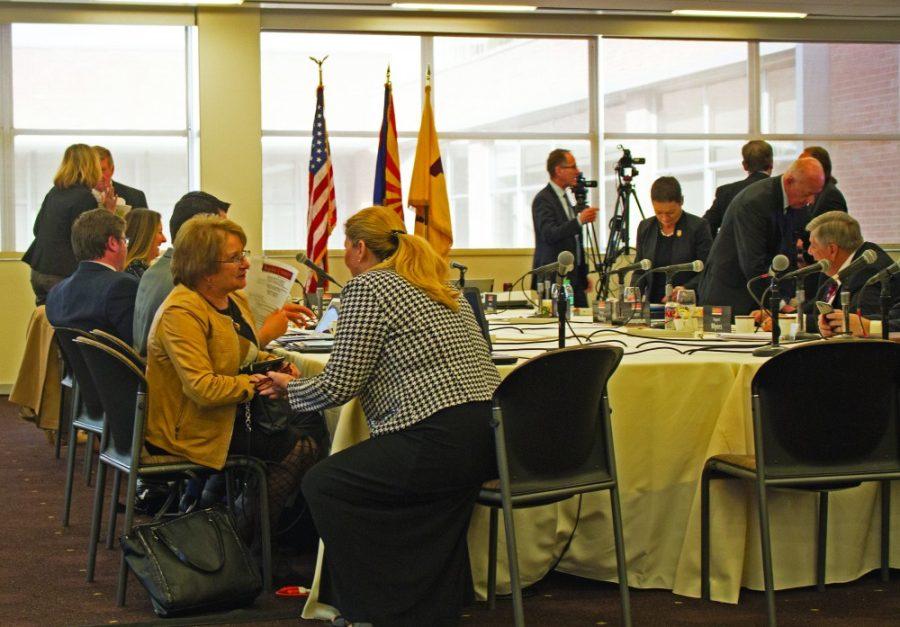The Arizona Board of Regents approved a 2-percent increase in base tuition on Thursday, April 5, with no change in mandatory fees for the University of Arizona for the 2018–2019 school year.
The increase — the lowest in five years — will not apply to continuing undergraduate students whose base tuition and mandatory fees rate were automatically locked in their freshman year through UA’s Guaranteed Tuition Program.
Incoming in-state freshmen at UA’s main campus will pay $219 more than the current resident rate, and out-of-state students will pay $688 more than the current non-resident rate. These rates will be guaranteed to them for eight consecutive semesters.
RELATED: ABOR releases tuition proposals, tuition prices projected to raise
Continuing undergraduate students without guaranteed tuition at UA’s main campus will pay $207 more if they are residents and $623 more if they are not residents.
All graduate students will see an increase in base tuition of no more than 2 percent, depending on residency status and which campus they will be attending.
Graduate students that are residents and attending UA’s main campus will pay $232 more than the current rate. New non-resident students will pay $631 more. Resident graduate students at UA South will pay $225 more than the current rate, while non-residents will pay $631 more.
The increases will help provide child care vouchers for students with children, as well as raises in salary for faculty.
“We have been transparent; these funds will be able to permit us for the first time to provide annual, merit-based increases for faculty,” said UA President Dr. Robert Robbins.
Thursday’s vote was the final step in the regents’ tuition-and-fee-setting process, which began when tuition proposals were released on March 16.
The regents then hosted a statewide hearing on Tuesday, March 27, where the public was allowed to speak on the tuition proposals.
“We had a terrific representation from our student government leaders. They had a lot of thoughts about our plans,” said Regents President Eileen Klein.
For Klein, the most important part of the tuition process was listening to students.
“If we keep an eye on our students and what they need, we’re going to ultimately be the most competitive group of the bunch,” Klein said.
Each university president then held a workshop on their proposals with the regents on Thursday, March 29.
“This special meeting gave regents the special opportunity for the presidents to take a deeper dive into their proposals,” said Regent Ron Shoopman.
College/Program specific fees also on rise
On Thursday, the regent’s also set differential tuition and fees for specific colleges and programs.
For example, students attending the College of Medicine – Tucson will see the highest increase in tuition, 2.9 percent, or $924 for resident students and $1,580 for non-resident students.
The regents approved the elimination of the College of Medicine’s program fee which ranged from $9,622 for resident students and $10,583 for non-resident students, so that a new differential tuition rate can be established.
Online students will pay $10 more per credit, which will be the first time tuition for UA Online has increased since it began in 2015.
The regents also approved six new program fees across four colleges, as well as a new $15 fee for the Office of the Registrar to cover some of the production costs of degree certificates for undergraduate and graduate degrees.
Other benefits of the tuition increase include plans to hire more counselors for UA Counseling and Psych Services, as well as hiring more financial aid counselors.
“To help them work through the often-times stressful process of securing financial aid services,” Robbins said.
RELATED: Recap: Regents public tuition hearing
For Arizona’s public university system, the regents aimed to keep the rate of increase in tuition as low as possible.
“Over the past five years, we have greatly stabilized tuition increases, we have actually slowed the rate of tuition increase considerably,” Klein said.
With state support for Arizona’s public universities decreasing, Shoopman is proud of how the university presidents operate their schools.
“Our university presidents do more with less, and it’s by intent,” Shoopman said. “But never at the sacrifice of quality.”
Follow Jordan Williams on Twitter








